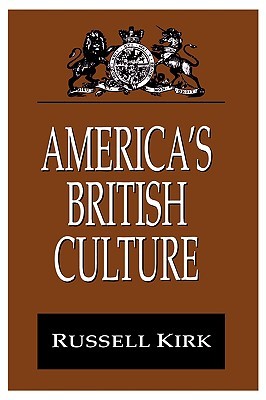America’s British Culture by the late Russell Kirk offers a clear, insightful explication of key British elements in American culture, as well as an important critique of the current cultural climate in America. Kirk examines four major British contributions that have particularly shaped American culture: language and a common body of literature; rule of law and the common law tradition; representative government; and ethical heritage—moral habits, conventions, customs, and the like. In an appendix he addresses the aspects of classical philosophy which, mostly transmitted through Great Britain, also continue to affect American mores and political modes of thinking.
Kirk stresses the importance of the King James translation of the Bible after 1611 in America and other works that exerted formulative influence on the Colonies. He shows that much more than abandonment of words and books is involved in the modern refusal to study the classics in favor of more “functional,” scientific, or politically correct fare. Indeed, since the body of English literature from Chaucer to Melville contains an operative set of cultural values largely independent of religion, discarding great literature involves the loss of the heroic values that animate it. To the extent that both religion and secular heroic values decline, American culture and civilization decline with them.
In terms of legal tradition, the considered decisions of able judges in a multitude of cases comprise the common law. In the absence of specific statutes, the law respects precedent and generally observes custom. The jury system comes from the common law tradition; so does the presumption of innocence. Kirk points out that this is most unlike civil or Roman law, which constitutes the legal tradition of most of Europe. Moreover, modern interpretations of the law as “living,” or as a tool for liberal social engineers and psychoanalysts, undermines the ancient rights of freeborn Englishmen, not to mention the Constitutional rights of American freemen.
American forms of representative government—Congress, state legislatures, county and municipal councils and school boards—also have roots in England. Kirk traces the development of representative government through the various stages in English history. He maintains that the American Revolution was fought over conflicting interpretations of the British Constitution, especially over the limits of Parliamentary sovereignty. The colonists had come to expect actual representation from their assemblies in matters involving “internal” taxation. Of course, the sad state of affairs is that the forms have been corrupted. Our country resembles a consolidated national democracy more than a republic. The momentary mob rules, led by special interests that play the country through Congress like some political pinball machine. Average taxes of 40 percent are taken through payroll deduction, and Americans find themselves held hostage by their own government—in the same state of political slavery that drove them from England in the first place.
In terms of an ethical heritage, every culture has drawn its mores or principles of morality primarily from religious belief, and America is no exception. Kirk spends some time delineating the various religious denominations in the Colonies. He quotes Tocqueville, however, saying the various sects comprised a broad Christian consensus concerning morality. Kirk puts it succinctly: “Out of Christian teaching arose America’s mores.” In addition. Kirk addresses the beginnings of higher education in America and shows how American universities were patterned on Cambridge and Oxford. Such universities satisfied both Enlightenment and Great Awakening impulses in Colonial America and the Early Republic. Oxford’s “God is my light” motto applied in substance to the American Ivy League as well. Anyone who doubts it can read the arches lining Harvard yard. They still stand, even as the inner temple is defamed.
Taken together, Kirk’s assessments of the four major cultural traditions received from Great Britain present a powerful, sometimes subtle argument about America. Kirk maintains that general culture is necessary to peace and stability in society at large. He demonstrates that civilizations are indeed predicated upon the interdependent relationship of high culture and coherent democratic culture of the people. He discusses at length the ongoing transmutation of American culture by counterculture and by relentless attacks on the key elements he described. His focus is on the process of the transmission of culture and the ways in which it is subverted in America by unhistorical and anti-historical education. The outcome, of course, is the disruption of the perennial cultural renewal, a loss of general culture, and the decline of American civilization.
Kirk proves that attempts to infuse “multiculturalism” into the schools at all levels result in a generational missing link. Hans Sennholz has likewise equated so-called “multiculturalism” with anticulturalism. It is in fact an attack on the Judeo-Christian culture of the West. Moreover, it constitutes the abandonment of our historic commitment to an American identity. Attempts to exorcise “dead white males” from history and literature and to equate all cultures impede progress and lead to intellectual provincialism. Declining academic standards attest that awareness of diversity in the world and in our own country has actually decreased.
Today, pupils are reduced to the eternal present, without perspective or context, intellectually confined to ever-diminishing boundaries of minority self-esteem. A “Curriculum of Inclusion” has become a curriculum of cultural disintegration. America’s British Culture is a timely reminder of what is at stake: that complex web of literature, law, government, and mores that constitutes the greatest cultural legacy in the history of mankind.
[America’s British Culture by Russell Kirk (New Jersey: Transaction) 122 pp., $24.95]

Leave a Reply